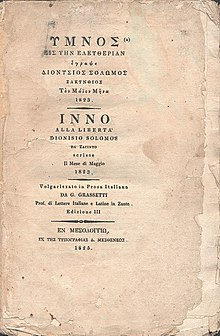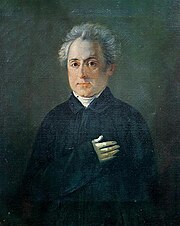Hymn to Liberty
| English: Hymn to Liberty | |
|---|---|
| Ὕμνος εἰς τὴν Ἐλευθερίαν Ὕμνος πρὸς τὴν Ἐλευθερίαν | |
 | |
National anthem of Greece and Cyprus | |
| Lyrics | Dionysios Solomos, 1823 |
| Music | Nikolaos Mantzaros, 1865 |
| Adopted | 1865 (by Greece)[1] 1966 (by Cyprus)[2] |
| Audio sample | |
"Hýmnos is tin Eleftherían" (instrumental)
| |
The "Hymn to Liberty" or "Hymn to Freedom" (Greek: Ὕμνος εἰς τὴν Ἐλευθερίαν,[a] also Ὕμνος πρὸς τὴν Ἐλευθερίαν),[b] is a poem written by Dionysios Solomos in 1823 that consists of 158 stanzas, which is used as the national anthem of Greece and Cyprus. It was set to music by Nikolaos Mantzaros, and is the longest national anthem in the world by length of text.[1][3] It officially became the national anthem of Greece in 1865, and Cyprus in 1966.[4][5][6]
History[]

Dionysios Solomos wrote "Hymn to Liberty" in 1823 in Zakynthos and one year later was printed in Messolonghi. It was set to music in 1865 by the Corfiot operatic composer Nikolaos Mantzaros, who composed two choral versions, a long one for the whole poem and a short one for the first two stanzas; the latter is the one adopted as the national anthem of Greece. "Hymn to Liberty" was adopted as the national anthem of Cyprus by order of the Council of Ministers in 1966.[7]
Lyrics[]

Inspired by the Greek War of Independence, Solomos wrote the hymn to honor the struggle of Greeks for independence after centuries of Ottoman rule.[8][9][10]
"Hymn to Liberty" recounts the misery of the Greeks under the Ottomans and their hope for freedom. He describes different events of the War, such as the execution of Patriarch Gregory V of Constantinople, the reaction of the Great Powers, extensively the Siege of Tripolitsa and the Christian character of the struggle.[c]
Greek original[]
| Greek original[11][12][13] | Transliteration | IPA transcription | Turkish translation (for Cyprus) | English translation[14] (Rudyard Kipling, 1918) |
|---|---|---|---|---|
Σε γνωρίζω από την κόψη |
